Before Afua joined our family, I read many books, I researched the best doctors and hospitals and I spoke (or facebook messaged, texted, skyped…) with moms who had adopted children with similar special needs. But no matter how much I prepared, some things still took me by surprise. Maybe they never came up in conversations or maybe this is the stuff we don’t usually talk about. Adoption is a beautiful way to grow a family (we had adopted before and knew this). Adopting a child with known special needs is a beautiful journey with its unique challenges that stem from loss, trauma and often unmet medical needs.
Learning the child’s diagnosis
I remember sitting at our Neurologist’s office and he patiently reviewed Afua’s MRI results with me. He described the areas of her brain that were affected by the lack of oxygen, that it likely happened during a certain part of the pregnancy and that in the end, the diagnosis given to her in Ghana, cerebral palsy, was correct. Hearing those words took my breath away, made me speechless as if I had no clue and this was a newborn baby with a devastating, unexpected diagnosis. I knew it was coming. This wasn’t a surprise. But in that instant I grieved the diagnosis as if I had not known. Adoptive moms are not superheroes, we grieve our children’s diagnoses as all mothers do. We may know what’s coming when a doctor confirms the test result. But it’s just as real and sad.
Then came a diagnosis I did not expect. The audiologist came to me as Afua was still in surgery.
“Profound hearing loss”
“it is unlikely she hears speech at all”
“deaf”
Tears were streaming down my face as I listened to her explain waves and decibels and hearing levels. It was like a foreign language and all I wanted was to hug my girl. But she was still in surgery so I sat in disbelief.
We are not extra tough as we process new diagnoses that sometimes come unexpectedly. When we say “yes” to adopting a child with special needs, it is not because we are expecting an easy road or we somehow are up for anything. We say yes to a child and we join their journey of medical diagnoses, different abilities and navigating a world that isn’t always as accepting as we want it to be. Because we firmly believe that every child regardless of their differences is deserving of a loving home and a family. And in the midst of our “yes”, we realize how much we needed them too.
When others notice your child is different
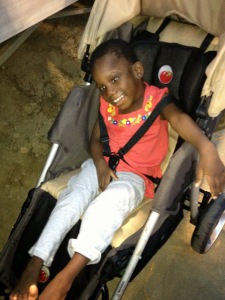
I remember the first time we went to a high school football game. Afua was in a stroller and I took her to the concession stand. Two little girls stood in front of us and one kept looking back. Then came the dreaded words: “What’s wrong with HER?” Don’t worry, I handled the situation with adult maturity, kindness and compassion (with a little bit of education thrown in for good measure). But it bothered me. It made me sad that there were children who were not around children with special needs. Children who didn’t know a nice way to ask why a child was in a stroller when they should be walking.
The truth is, as I have parented Afua, the less I think of her disabilities. I see my daughter. I know her smiles and her expressions. We have a language and I know how her body moves. None of it is strange or unusual to me. But other people (strangers usually) will remind me that she is not typically abled. They do it by their looks, their stares and their comments.
Friends may or may not stick around
This journey is hard to understand, right? I’ve had people ask me why we would choose to parent a child with special needs. When you adopt, you get to pick, they say. Some have hinted that we are trying to prove ourselves to be special, faith filled or we just may not have thought this through. They know our time alone as a couple is non existent. They see the way our life is stretched thin. Some choose to continue our friendships (even thought we aren’t always the most consistent company). Others have stopped asking, and that’s ok too.
What I have found is that the friendships that have remained have become so special and authentic. There is no pretending that this is all easy and smooth. They also see the absolute beauty that exists, the way Afua is changing all of us and how she is an equal member among the siblings. Those who take the time to know Afua get why she is in our family. She belongs with us and we belong with her.
You will doubt your abilities and it’s ok
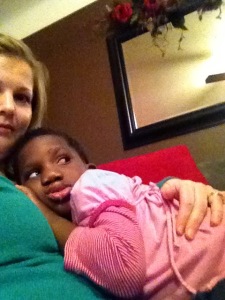
I am not an organized person by nature and it is a vital skill when parenting a medically complex kiddo. I also work part-time which makes things challenging. Afua is one of 5 children and they also have appointments and needs to be met. Honestly, there are days that I wonder how to juggle it all. In the process of figuring it out, I have learned to let go control (so hard!!!) I’ve reached out for help (so humbling!!!) and I have had to find organizational tools that work for me.I am still struggling with this area of parenting but modern technology is helping me keep most of my appointments :)I know I can’t do this by myself and I don’t have to. I have a great husband, wonderful family and friends and also a caregiver that fills in as needed. Our life is richer because we aren’t doing it all alone.
You will find allies in the most unlikely places
Parenting a child with special needs means you spend a lot of time in local children’s hospitals, therapy clinics, surgery waiting rooms and doctor’s offices. There you will meet
other families who are exhausted yet so proud of their children just as you are. We give each other “the nod” and in silence we know that there are others who are walking this path too. And whether we chose this journey or we discovered a diagnosis along the way, there is a mutual acknowledgment of the hard.
You will meet therapists who are innovative, energetic and supportive. They tell you to take a break and get a cup of coffee while they help your child achieve a new skill or make them more comfortable. You meet doctors who devote their lives to children and their families and you are not just a number. They explain things in a way that makes sense and guide you through tough decisions as if they were making them for their own children. Allies are everywhere and it makes things a bit better.
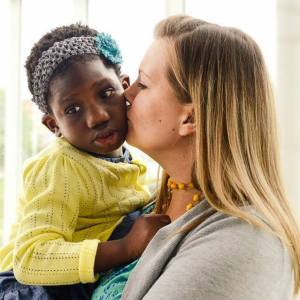
I share these thoughts in hopes that I am not alone. That others may feel the same grief, the same joy and the same purpose in parenting a child with special needs. That maybe your friendships were tested also and the invitations are fewer. That maybe your child wasn’t adopted but you recognize these feelings as universal. And maybe this opens a conversation about special needs, adoption or even prompts someone to reach out to a family raising a child with special needs.
______________________________

Jenni is a mother of 5, married for 19 years to her high school sweetheart Eric. Her children range in age from preschool to high school by birth and adoption. Jenni works part-time in a charter school system providing therapy services for children with special needs. Jenni is a advocate for orphaned children with special needs and is passionate about family preservation. When she is not driving her minivan to various activities and appointments, she can be found blogging at Joyful Journey.

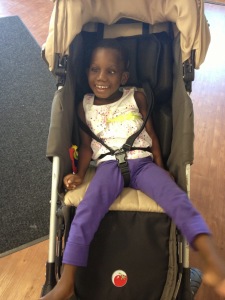
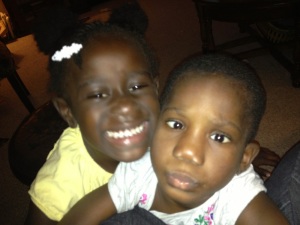

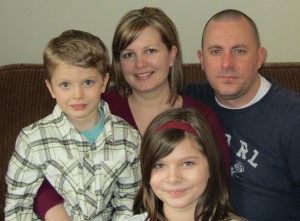 Jenni is first and foremost a daughter of our Heavenly Father. She has been married for 16 years to Eric. Together, they have a daughter Emmi (12), Jakob (6), and recently received news that their Visa interview in Ghana will be at the end of this month so they can become parents to Kofi (6) and Agyeiwaa (3). Jenni’s prayer is to have all her children under one roof soon. Jenni began her adoption process a year ago when God broke her heart for the fatherless. Jenni writes
Jenni is first and foremost a daughter of our Heavenly Father. She has been married for 16 years to Eric. Together, they have a daughter Emmi (12), Jakob (6), and recently received news that their Visa interview in Ghana will be at the end of this month so they can become parents to Kofi (6) and Agyeiwaa (3). Jenni’s prayer is to have all her children under one roof soon. Jenni began her adoption process a year ago when God broke her heart for the fatherless. Jenni writes